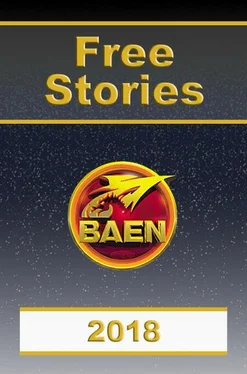Now there was a little uncomfortable stirring amongst the gathered officers, the chief diesel man, the top torpedo man, one of the radio operators. The navigator, of course. The warrant officers assigned. What?
“A point of interest, Herr Kahloin,” Heimsat—one of the machinists’ mates—said, diffidently, when Rathke didn’t speak. “There was U-728. Does Herr Kahloin remember? They also saw the Höllander . And when they were depth-charged their position was off Jan Mayen Island, but by the time they got their radio working they were near Gibraltar, and there was no explanation.”
That was not a completely accurate statement. There had been several explanations proposed. “I have heard of that,” Lachs said slowly, wondering how much was known amongst the crews of what was said amongst the officers. Also vice versa. “It was said there was an error in navigation. Milrauch insisted there had not been any such thing.”
Milrauch had been transferred away from his boat, condemned to shore duty. There had seemed little doubt that the boat had sustained severe damage in a massed Allied attack in the Arctic Ocean; Milrauch had lost his nerve, it was said, and fled the scene. Lachs had heard some perplexity as to how the boat had gotten from Jan Mayen to Gibraltar with its fuel tanks so little depleted, but since there had been a suspicious whiff of cowardice about the only possible explanation the matter was not much discussed.
Heimsat nodded, as did some of the others. “In fact no rational explanation, Herr Kahloin, so it was said that errors had crept in to the story as it was told. But now we consider that U-728 had descended to an unknown depth as a result of an attack, and when it surfaced it was someplace very much else. That is what we have heard. That is why we suspect that the only way out of Lake Superior is to descend as deeply as we dare, and see where we are, when we come up.”
Lachs took a deep breath. Then he let it out again. “Thank you for your report, men,” he said. “I will let you know when I have made a decision.”
They made their salutes. He returned them. Then he waited while everybody left, the men, his LI, his ZweiVo; it was just him and Goond, and Lachs leaned forward to lean his crossed forearms against the railing to disguise his involuntary slump of indecision. Yes, he was the commander. Yes, it was his decision, and he had accepted the responsibility years ago.
And still he was very glad to have Goond here to help him clarify his thinking, and would wait to see what Goond had to say about the problem that they faced.
* * *
Now that the crew had made their report and gone away Goond stood with Lachs on the lake-facing rail of the porch that surrounded their cabin, looking out across the water. It was a nice resort, and if it was not entirely up to modern standards—the old man had made a remark about that from time to time, in passing—that only meant it was closer to their own time, which reduced the psychic strain of their situation a little.
Closer to their own time, maybe, but still nowhere near to their own place. Goond felt farther and farther away from that with every reference article he read on the PC the old man had made available for their use—one in each cabin, some older, some newer, all technological marvels that had too much information on them to be grasped. Goond had done his best to stick to the essentials: it was 2005, “World War Two” had been over for sixty years, and U-818 hadn’t survived it.
Lachs was leaning over the railing with his folded arms braced to the weathered wooden cap-board, squinting into the westering sun. He hadn’t had much to say about the old man. The old man kept clear of Lachs as much as possible, while at the same time offering every apparent courtesy. There was an old woman about the place, though Goond didn’t think anybody had seen her. He’d decided he had better things to occupy his mind than that. How old would the captain’s lady be, in 2005?
“We can’t stay,” Goond said. “No matter how easy it might seem.” Yes, it was beautiful. Yes, it was pleasant, comfortable, safe, and they were alive. But they hadn’t any business being here. Goond wasn’t sure anybody wanted to go back—since that could well be going back to being dead—but what else were they to do? There was no role for a U-boat anywhere in this modern world. There were genuine submarines now, nuclear-powered. Goond had read up on the subject.
“We have hypotheses, but no understanding.” Lachs’ voice was contemplative, with a subtle undertone of unwillingness to accept Goond’s remark, of wishing to stay safe and warm and comfortable. Goond understood completely. He agreed. “There is only the one thing clear, above all others. I can think of no other way around it.”
Goond could think of several things that were clear. He waited. Lachs surprised him, time and again; they knew each other well enough to rely on each other’s decision processes, on each others’ actions, but not well enough to be able to guess each others’ innermost thoughts too readily. It kept the relationship from becoming boring, which was important, when men spent as much time together as they had in quarters as close as a U-boat. Friendships could be broken under such strains, as well as forged and strengthened.
“Look at this lake,” Lachs said. “We used to own the oceans of the world. And now the lake has become our prison. We can’t get out, Goond. We’re trapped. Unless we abandon U-818, which I will not do, not if I am the only man remaining.”
This was no Bay of Biscay. There were no enemy mine-layers between them and the Atlantic, no British bombers, no destroyers. There were only the locks. Gunther Prien—the first of Herr Hitler’s incomparables—had barely slid his U-47 into Scapa Flow and out again; there was no creeping through these locks from lake to lake, and there were how many, between them and their freedom? Did it even matter? One was enough.
The world might be at peace. But locks were attended by their very nature, their fill-and-flush cycles carefully controlled, every close and open documented, and every ship as well. There was no hope that any fifty men could break in to the dockmaster’s control station and sneak anything through in the middle of the night.
“I don’t think any of us really can leave U-818,” Goond admitted. “Though if someone wants to badly enough, I don’t know how we would stop them, short of tying them up in the torpedo room. Which could be bad for morale.”
Disappearing into the local population could be done—at least for the short term, to go by the news. But they all had experience in wading through propaganda for underlying facts. They were undocumented. They had no money with which to purchase documentation. The boat had no registry. Nobody was licensed to own or operate.
Lachs nodded. “We overstay our welcome, if we’re not careful. Then who knows what might happen.” An internment camp; one not likely to be as comfortable as the “Salmon Shore” resort. They could move the boat to Duluth, or any one of a number of smaller ports: but they’d just be postponing the inevitable. “The best escapes are made the closest to the point of capture. I personally see few better alternatives.”
When they’d seen the Flying Dutchman , they’d seen a ghost. To see a ghost was to share the same liminal space as a ghost, between the worlds of the living and of the dead. To share that space was to become contaminated. They were in that space now.
And the last thing that had happened to them before they had surfaced sixty years and four thousand miles from where they’d gone down was that they had been bombed into an emergency dive that had become an uncontrolled descent to an undetermined depth. At the time Goond had assumed that they were not at impossible depths, because the boat had not collapsed in on itself, because the water pressure forcing the water in through every minute crack or tiny fault did not have the force of a blow-torch cutting them into pieces.
Читать дальше








![Тим Пауэрс - Последние дни. Том 2 [litres]](/books/393813/tim-pauers-poslednie-dni-tom-2-litres-thumb.webp)
![Тим Пауэрс - Последние дни. Том 1 [litres]](/books/394090/tim-pauers-poslednie-dni-tom-1-litres-thumb.webp)
![Тим Пауэрс - Последний выдох [litres]](/books/402145/tim-pauers-poslednij-vydoh-litres-thumb.webp)